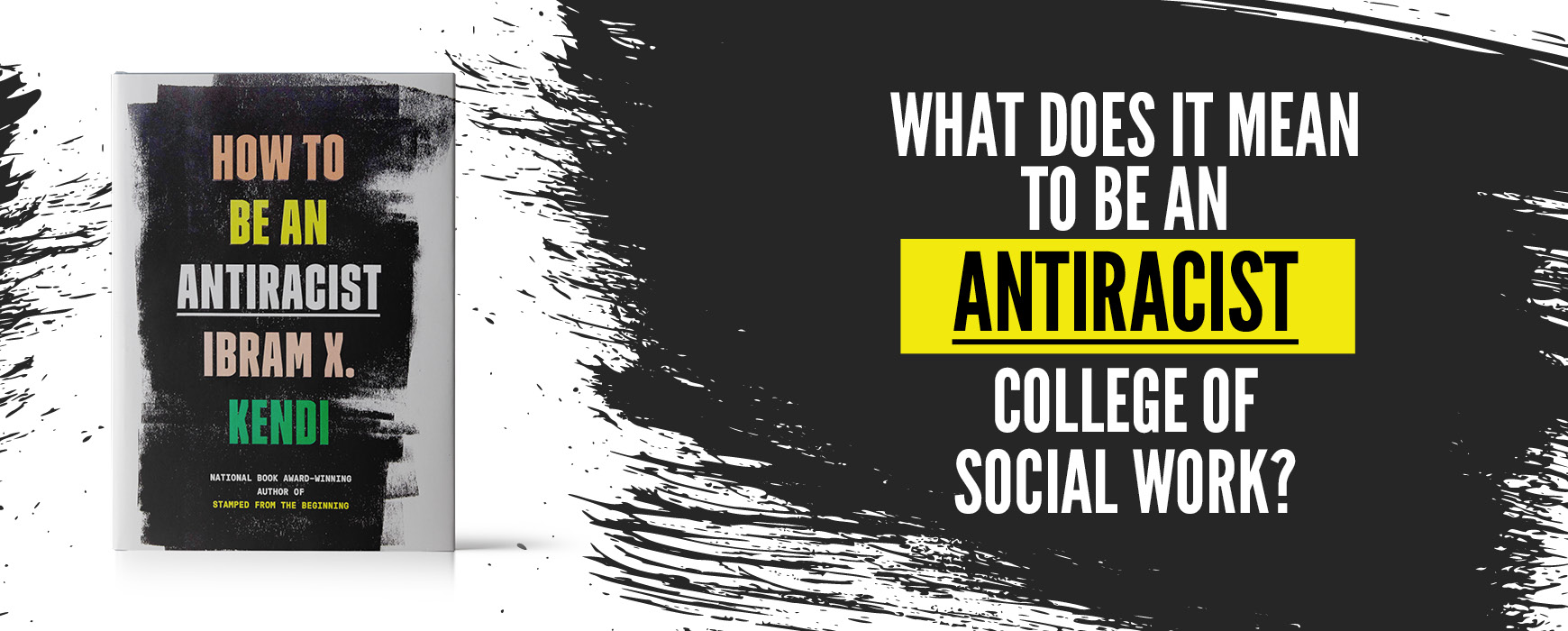Spring 2020 GCSW Antiracist Initiative

February 10, 2020
(HOUSTON, TX) – GCSW faculty, staff, and students are beginning the first semester of 2020 with a series of initiatives designed to help us explore what it means to be an antiracist College of Social Work. Our efforts are in keeping with our vision of achieving social, racial, economic, and political justice, local to global, and in recognition that the change we want to see begins with us.
Before winter break, each member of the College was given a copy of Ibram X. Kendi's How To Be an Antiracist. A leading scholar on race and executive director of the Antiracist Research and Policy Center, Professor Kendi's work was selected as the foundational text in preparation for antiracist initiatives throughout the Spring 2020 semester. The book provides an opportunity for GCSW faculty and staff to learn together and grapple with the subject in a bi-monthly book club. The discussions will serve as an important part of framing the work and what we hope to accomplish together as a College.
On selecting the How To Be an Antiracist, Dean Alan Dettlaff shared, "The fundamental concept of Dr. Kendi's book is there is no such thing as being 'not racist.' Every policy, every idea, is either racist or antiracist. Every policy, every idea, either maintains racial inequity or works to achieve racial equity. Institutions of higher education were established to maintain White supremacy. Given these racist origins, and as a College of Social Work with a commitment to racial justice, we need to examine every aspect of our policies, our curriculum, and our structures to ensure they are intentionally designed to produce and sustain racial equity. This work is just a beginning, but it is an essential first step."
The second initiative in our semester-long effort focuses on the student experience. As conversations about race among students have increased organically in GCSW classrooms as they have throughout the country, GCSW faculty and administration recognized a need to strengthen how they facilitate those discussions. On March 6, all faculty and administrators will participate in a Teaching Institute on having conversations about race and privilege in the classroom. Increasing the effectiveness of students' and faculty's ability to engage in constructive and progressive discussions around race is critical to the College's to antiracist efforts.
Racial justice has been a cornerstone of Clinical Assistant Professor, Aabha Brown’s work. Both as a social worker and in her role as faculty member and Foundation Coordinator, she has been deeply committed to moving those discussions forward among both students and colleagues.
"The social construct of race has been used to create and uphold values, structures, policies, and social norms that influence economic security, health, safety, as well as our interactions with one another. Although race has a significant influence on how we understand personal and societal values, race is a construct that, collectively, we find difficult to discuss or even acknowledge. Antiracist efforts are important in Colleges of Social Work to provide opportunities to gain more understanding about how race has been used to foster inequity in our society and to gain self-awareness about our own views of race. Ethical social work practice requires us to understand ourselves as well as the systems we seek to influence," said Aabha Brown.
The third initiative, Undoing Racism workshops, is funded by a Multicultural Success Initiative Grant, which was awarded under the leadership of Assistant Dean of Admissions and Student Affairs, Amber Mollhagen. GCSW faculty, staff, and students will participate as a community in workshops designed to "help individuals, communities, organizations, and institutions move beyond addressing the symptoms of racism to undoing the causes of racism so as to create a more just and equitable society." The nationally recognized training will be facilitated by the People's Institute for Survival and Beyond, a national and international collective of antiracist, multicultural community organizers and educators dedicated to building an effective movement for social transformation.
"The Undoing Racism workshops will help students as well as the GCSW community better understand the larger context of human diversity and the forms and mechanisms of oppression and discrimination, and with this self-awareness be able to better manage personal biases in working with diverse settings, colleagues and clients. Staff and faculty will also be able to increase awareness around their interactions with students and be able to provide a better environment in which students can reach their full potential. Having additional professional development and academic enrichment opportunities to supplement and support the learning taking place in the classroom is critical but often challenging to implement due to limited resources. We have an opportunity here," said GCSW Assistant Dean Mollhagen.
While these initiatives require a considerable commitment from GCSW faculty, staff, and students, reading and discussing How To Be an Antiracist, attending the Teaching Institute on race and privilege, and participating in the Undoing Racism workshops are efforts the GCSW believes will help benefit the entire community.
"Efforts around antiracism offer a unique opportunity to participate in learning together. These types of conversations and experiences can foster deeper understanding about how the construct of race impacts us on personal and systemic levels. This understanding can encourage increased empathy and motivation to change structures, practices, and norms that create inequity based on race," said Aabha Brown.
By engaging in this work together, the GCSW strives to continue our efforts towards our vision of achieving social, racial, economic, and political justice, local to global.
"I hope we all gain the patience to genuinely listen & learn from one another. I hope we all gain the confidence to challenge inequitable systems and norms. I hope we all gain inspiration from each other," said Aabha Brown.